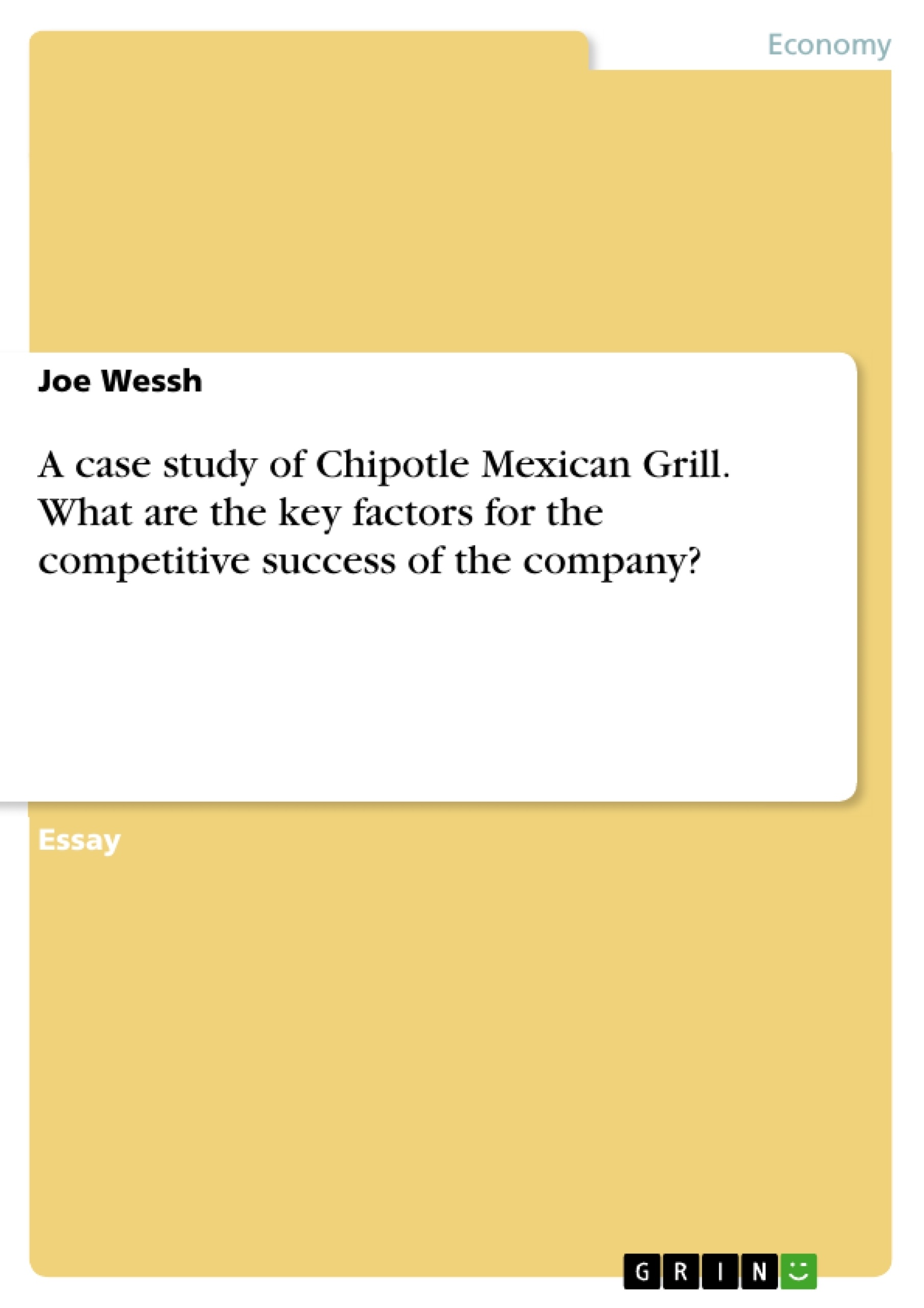Despite the industry within which a company operates, there are various key success factors that enable a company to survive and develop. Key success factors are an essential part of the company's competitive success and it is this important that the company pay a considerable attention to them. The elements of a company must correspond with the key success factors required in the industry in order for it to survive and grow. As far as the case is concerned, the fast-casual restaurant industry is heavily competitive, making it hard for most of the restaurants to survive and remain successful.
Six major rivals; Burger King Corporation, Jack in the Box, McDonald's, Wendy's Group, Starbucks and Yum! Brands, occupy about 40 percent of the market. The remaining 60 percent consists of smaller competitors such as Panera, Panda Express and Chipotle Mexican Grill. Each competitor offers distinguishable products aligned with their core capabilities. Hence, the intense threat of rivalry in this industry requires restaurants to be distinctive and innovative so that they can achieve a competitive edge. Those restaurants that are unable to maintain a constant competitive advantage end up failing.
Table of Contents
- Question 1 - Key Success Factors
- Question 2 - SWOT: Threats
- Question 3 - Ethical Standards
- Question 4 - Best Practices
Objectives and Key Themes
This case study analyzes Chipotle Mexican Grill's success within the competitive fast-casual restaurant industry. The objective is to identify key success factors, assess threats, examine ethical considerations, and explore best practices contributing to the company's performance.
- Key Success Factors in the Fast-Casual Restaurant Industry
- Competitive Threats and Industry Dynamics
- Ethical Considerations and Sustainable Practices
- Importance of Operational Efficiency and Customer Experience
- Financial Stability and Strategic Resource Management
Chapter Summaries
Question 1 – Key Success Factors: This chapter examines the critical factors driving Chipotle's success in a highly competitive market. It highlights the importance of aligning menu offerings with evolving consumer preferences, emphasizing healthier dining options and superior food quality. The chapter also stresses the significance of efficient order fulfillment through optimized restaurant layout and online ordering capabilities, contributing to a positive customer experience. Furthermore, it underscores the role of effective management and operations, focusing on employee engagement and fostering a positive customer interaction to build brand loyalty. The chapter concludes by examining the strategic importance of ingredient sourcing, cost control, and maintaining a strong financial position to support future growth and innovation. Chipotle's ability to balance these factors is crucial for sustained competitive advantage.
Keywords
Chipotle Mexican Grill, fast-casual dining, key success factors, competitive advantage, customer experience, operational efficiency, ethical standards, ingredient sourcing, financial stability, sustainable practices, competitive threats.
Chipotle Case Study: Frequently Asked Questions
What is the purpose of this document?
This document provides a comprehensive preview of a case study analyzing Chipotle Mexican Grill's success. It includes the table of contents, objectives and key themes, chapter summaries, and keywords.
What are the key themes explored in the case study?
The case study examines several key themes, including: Key Success Factors in the fast-casual restaurant industry; Competitive Threats and Industry Dynamics; Ethical Considerations and Sustainable Practices; Importance of Operational Efficiency and Customer Experience; and Financial Stability and Strategic Resource Management.
What are the main questions addressed in the case study?
The case study addresses four main questions: Key Success Factors, SWOT Analysis focusing on Threats, Ethical Standards, and Best Practices.
What are some key success factors for Chipotle, as discussed in the case study?
Key success factors for Chipotle include aligning menu offerings with consumer preferences (healthier options, high-quality food), efficient order fulfillment (optimized restaurant layout and online ordering), effective management and operations (employee engagement, positive customer interaction), strategic ingredient sourcing, cost control, and maintaining strong financial stability.
What competitive threats are analyzed in the case study?
While not detailed in this preview, the case study analyzes competitive threats and industry dynamics impacting Chipotle's position in the fast-casual restaurant market.
How does the case study address ethical considerations?
The case study examines ethical considerations and sustainable practices employed by Chipotle, likely focusing on responsible sourcing and environmental impact.
What role does operational efficiency and customer experience play in Chipotle's success?
The case study highlights the importance of operational efficiency (optimized processes) and positive customer experience (building brand loyalty through interaction) as crucial factors in Chipotle's success.
What is the significance of financial stability and resource management for Chipotle?
The case study emphasizes the role of financial stability and strategic resource management in supporting Chipotle's growth and innovation.
What are the keywords associated with this case study?
Keywords include: Chipotle Mexican Grill, fast-casual dining, key success factors, competitive advantage, customer experience, operational efficiency, ethical standards, ingredient sourcing, financial stability, sustainable practices, and competitive threats.
Where can I find a more detailed analysis?
This document is a preview. The full case study provides in-depth analysis of each topic mentioned.
- Quote paper
- Joe Wessh (Author), 2019, A case study of Chipotle Mexican Grill. What are the key factors for the competitive success of the company?, Munich, GRIN Verlag, https://www.grin.com/document/493825




